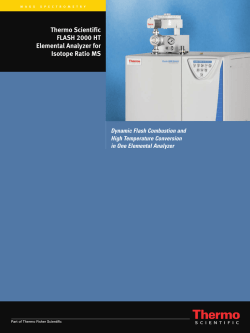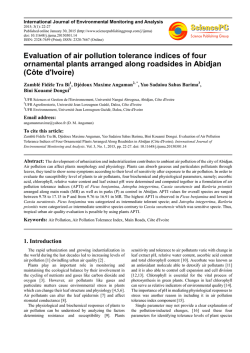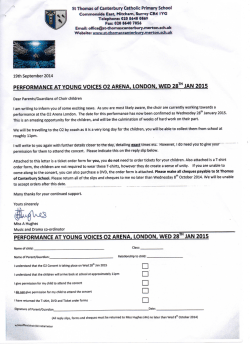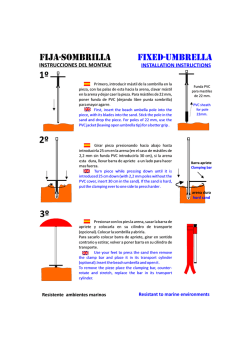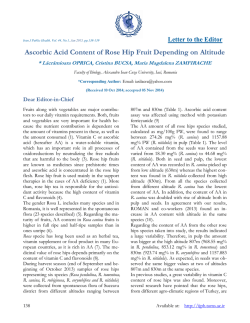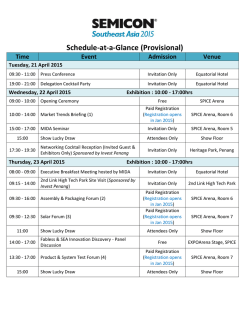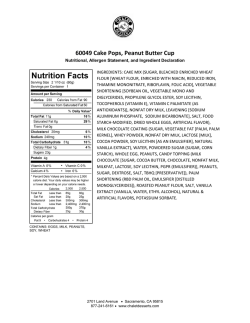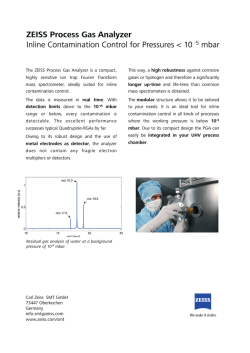
Read more - Thermo Scientific
D i s c r e t e A n a ly z e r Cas e S tud y Benchmarks and Rapid Results for a Jam Producer In 2013, the Discovery Lab at Smucker went through a planned reorganization to upgrade their technical equipment and automate their processes. Prior to the reorganization, they were testing approximately eight juice samples per week for multiple parameters. Using traditional methods, the analysis of sugars only could take up to one week, however, their R&D department required benchmark values daily. To improve their processes, they added a Thermo Scientific™ Arena™ discrete analyzer to their laboratory with excellent results. The Smucker’s Barn Store and Café. In 1897, Jerome M. Smucker built a small apple cider mill on a street that is now called Strawberry Lane in Orville, Ohio. Farmers would bring their apples to Smucker for pressing into cider. If there was a surplus of pressed juice, they would sell the extra cider back to Smucker who used it to make apple butter. This first product was sold off the back of a horse drawn wagon. Officially incorporated in 1921, the J. M. Smucker Company installed additional equipment for the manufacture of preserves and jellies a few years later. National distribution throughout the US began in 1942 when preserves and jellies were initially shipped to Los Angeles, California. In the early 1960’s, the company began to grow and expand acquiring existing jam and jelly manufacturers and introducing a line of peanut butter. Today, the J. M. Smucker Company owns or licenses multiple recognizable brands in the US including Pillsbury, Hungry Jack, Folgers, Jif, Knotts Berry Farm, Laura Scudders, and Crisco. Brands sold to Canadian consumers include Crosse & Blackwell, Robin Hood, Carnation, and Bick’s. Recent acquisitions include True Roots gluten free products and Sahalie nuts and trail mix. “Now we can run 50 samples in one hour,” said Tiffany Highben, Senior Analytical Chemist at Smucker’s Discovery Lab, then she added, “It’s really easy to teach the idea of a color change to a new technician.” Their new Arena analyzer uses a photometer with a halogen lamp to read samples and provide results. Since all the steps in the process are automated, it is easy to use, requires minimal intervention from the analyst, and provides results quickly. Tiffany Highben, Megan Perz, and Brittany Pleat Analytical Chemists, J. M. Smucker Company. D i s c r e t e A n a ly z e r | Calibrator Brittany Pleat with the Arena analyzer. Response (Absorbance) Concentration (mg/L) Calculated Concentration ACS-30 0.198 29.787 30 ACS-100 0.677 100.363 100 ACS-200 1.352 199.851 200 Highben, accompanied by her colleagues, Megan Perz and Brittany Pleat, also Analytical Chemists, run a variety of sugar and acid tests as back up for an outside lab as well as for internal R&D purposes. “If we need to do a benchmark test, we use discrete analysis,” shared Megan Perz. Fruit juices and purees as well as flour are tested for the flowing sugars: glucose, fructose, and sucrose, and these acids: acetic, ascorbic, and citric. To authenticate fruit products, d-malic and l-malic acid tests are run. “Now we can run 50 samples in one hour.” Tiffany Highben Senior Analytical Chemist, Smucker’s Discovery Lab Ascorbic Acid Calibration Response (Absorbance) Case S tu d y Smucker’s Discovery Lab. 1.5 1 0.5 0 0 50 100 150 Concentration (mg/L) Figure 1. Ascorbic acid calibration data. 200 250 D i s c r e t e A n a ly z e r Most testing is done on research samples, hence the requirement for a quick turnaround. The Arena discrete analyzer is fast and flexible and can provide the desired results in a timely manner. About Ascorbic Acid Testing Ascorbic acid is the scientific name for vitamin C and its addition to fresh wheat flour as a refined, denatured substance improves baking quality. Categorized as a dough conditioner, it acts as a reducing agent which helps weaken the protein network of flour. In the presence of O2, ascorbic acid becomes an oxidizing agent allowing the dough to retain gas and ultimately produce bread with a finer crumb cell structure while maintaining its plump shape. In other words, it improves the activity of yeast during fermentation and baking. Benefits include reduced mixing and proofing times and improved elasticity. Added in this manner to flour, ascorbic acid is present in much smaller quantities than the daily recommended dose for vitamin C. It also does not contain the beneficial bioflavonoids or nutrients usually found in fresh fruit. In addition, any mill adding ascorbic acid to its flour is required to declare the substance (E300) on its label. www.thermoscientific.com/discreteanalysis ©2015 Thermo Fisher Scientific Inc. All rights reserved. ISO is a trademark of the International Standards Organization. All other trademarks are the property of Thermo Fisher Scientific and its subsidiaries. This information is presented as an example of the capabilities of Thermo Fisher Scientific products. It is not intended to encourage use of these products in any manners that might infringe the intellectual property rights of others. Specifications, terms and pricing are subject to change. Not all products are available in all countries. Please consult your local sales representative for details. Africa +43 1 333 50 34 0 Australia +61 3 9757 4300 Austria +43 810 282 206 Belgium +32 53 73 42 41 Brazil +55 11 3731 5140 Canada +1 800 530 8447 China 800 810 5118 (free call domestic) 400 650 5118 CS71452-EN 0115S Denmark +45 70 23 62 60 Europe-Other +43 1 333 50 34 0 Finland +358 9 3291 0200 France +33 1 60 92 48 00 Germany +49 6103 408 1014 India +91 22 6742 9494 Italy +39 02 950 591 Japan +81 6 6885 1213 Korea +82 2 3420 8600 Latin America +1 561 688 8700 Middle East +43 1 333 50 34 0 Netherlands +31 76 579 55 55 New Zealand +64 9 980 6700 Norway +46 8 556 468 00 Thermo Fisher Scientific, Sunnyvale, CA USA is ISO 9001 Certified. Russia/CIS +43 1 333 50 34 0 Singapore +65 6289 1190 Sweden +46 8 556 468 00 Switzerland +41 61 716 77 00 Taiwan +886 2 8751 6655 UK/Ireland +44 1442 233555 USA +1 800 532 4752 Cas e S tud y Ethanol, calcium, pH, protein, and glycerol tests are also done on fruit products. In addition, a frozen liquid coffee product which is available only to industrial customers has its production and process water tested.
© Copyright 2026
